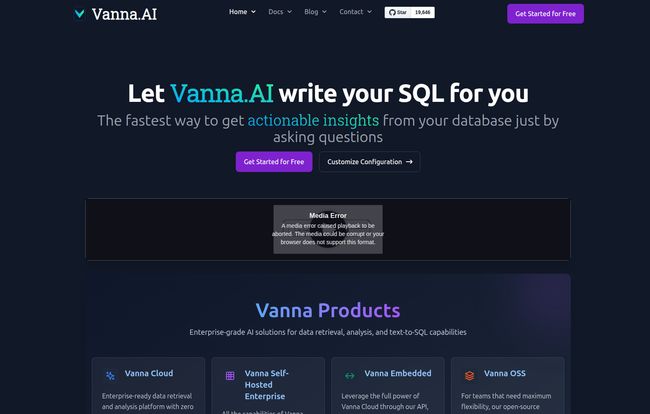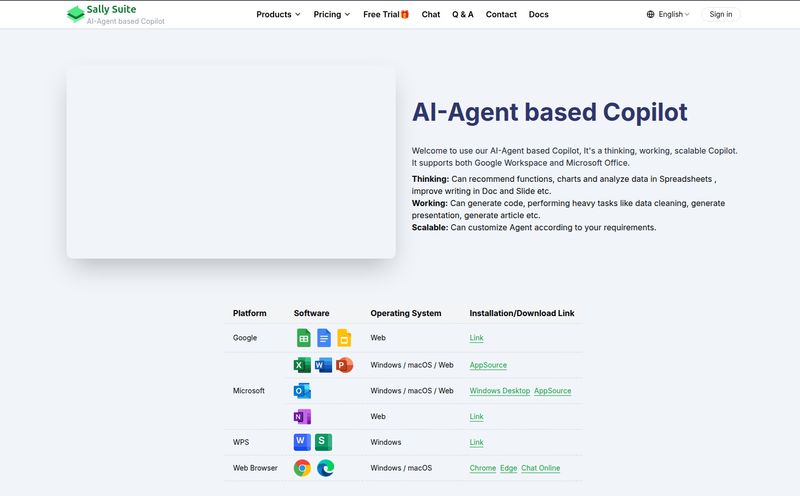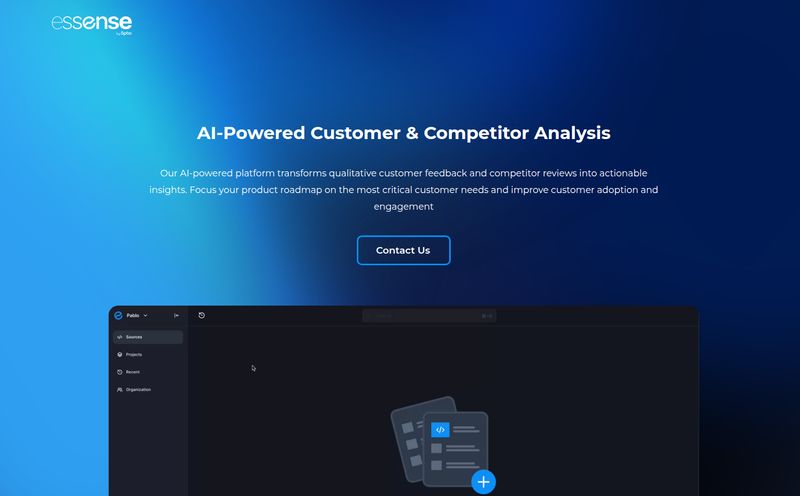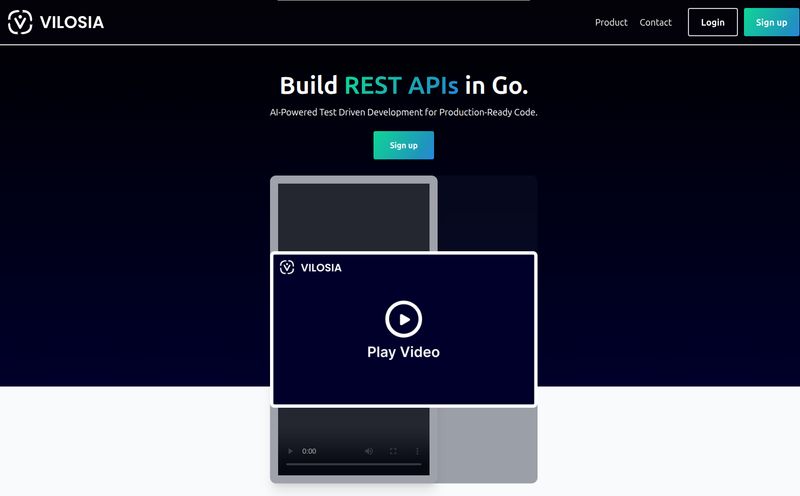If you've spent any time in the marketing, data, or dev world, you've felt the pain. That deep, soul-crushing moment when you need a very specific piece of data, and you know it's buried somewhere in a massive database. You stare at your screen, the blinking cursor mocking you, as you try to remember the exact syntax for a `LEFT JOIN` combined with a `CASE` statement and three `WHERE` clauses. It’s a headache. A real one.
I've been in that trench for years. I've built my career on generating traffic and analyzing trends, and I can tell you that the biggest bottleneck is often just getting the right data out of the system. We've hired analysts, we've bought fancy BI tools, and we've all tried to become part-time data wizards. It's exhausting.
So when I first heard about a tool called Vanna.AI, I was skeptical. An AI that writes SQL for you? Sounds like something from a sci-fi movie. But the more I looked into it, the more I realized... this might actually be the real deal. This isn’t just another chatbot; it’s a specialized tool designed to solve one of the most persistent problems in modern business.
So What Exactly is Vanna.AI?
At its core, Vanna.AI is a Python-based AI SQL agent. That’s a lot of jargon, so let me break it down. Think of Vanna as a hyper-intelligent interpreter. You, the human, ask a question in plain English like, “Hey, what were our top 10 selling products in the Northeast region last quarter?” Vanna takes that question, thinks about it, and translates it into the complex, perfectly-formed SQL query needed to pull that exact information from your database. All in seconds.
It’s designed to be used in all the places data pros already live—Jupyter notebooks, Slack, Streamlit, you name it. The goal is to make data interaction conversational, not syntactical.
The Core Idea That Makes Vanna Different
Now, my first thought—and maybe yours too—was, “Heck no, I’m not letting some AI have the keys to my company’s data kingdom.” This is where Vanna did something really smart. Vanna does not train on your data. Let me say that again, because it's the most important part: It never actually sees the sensitive contents of your database tables.
Instead, it trains on your metadata. This includes things like:
- Your database schema (DDL statements): The blueprint of your database tables and columns.
- Documentation: Any notes or descriptions you have about what certain tables mean.
- Past SQL queries: It can learn from queries that your team has already written and approved.
It's like teaching a new chef how to cook by giving them your recipes and a tour of the pantry, without letting them taste the final dish. They learn the structure, the ingredients, and the process, which is all they need to write new recipes. This security-first approach is a massive win and immediately put my CISO-minded paranoia at ease.
Exploring the Vanna.AI Product Family
Vanna isn’t a one-size-fits-all solution. They’ve broken it down into a few different flavors, which I actually appreciate. It shows they understand that a solo developer has different needs than a massive corporation.
| Vanna Version | Who It's For | My Take |
|---|---|---|
| Vanna OSS | Developers, tinkerers, and teams who want full control. | This is the open-source heart of it all. If you love getting your hands dirty and have the tech skills, this is your playground. Maximum flexibility. |
| Vanna Cloud | Teams that want a managed, hassle-free solution. | The “get started now” option. Vanna hosts it for you, handles the backend, and you just plug in and go. Perfect for most businesses. |
| Vanna Self-Hosted | Enterprises with strict data-residency or security needs (think finance, healthcare). | For the big players who need everything to run within their own private cloud (VPC). You get all the power, but inside your own fortress. |
| Vanna Embedded | SaaS companies and developers building products. | This is cool. You can use their API to build Vanna's “ask a question” functionality directly into your own software for your customers. |

Visit Vanna.AI
My Favorite Things About Vanna (The Good Stuff)
After playing around and reading up, a few things really stand out. First, it’s fast. And based on their own whitepaper benchmarks, it can be surprisingly accurate, especially when compared to just throwing a question at a generic LLM. That accuracy, however, comes with a big asterisk which I'll get to in a moment.
The open-source nature is a huge plus for me. I’ve been burned by proprietary platforms that get acquired and shut down, or suddenly triple their pricing. With Vanna OSS, the community has the code. It fosters transparency and customization that you just dont get with a black-box tool.
And let's talk about its database support. It's built to be agnostic. Snowflake, BigQuery, Postgres, Oracle, SQL Server... it speaks all the major dialects. In a world where most companies have a messy mix of databases, this flexibility is non-negotiable.
But I have to circle back to the security model. In an age of constant data breaches, building a tool that gets its job done without needing access to PII or sensitive business data is just... chef's kiss. It shows they're not just building a cool tech demo; they're building a tool for serious, professional use.
Let's Be Real: The Not-So-Perfect Parts
No tool is perfect, and Vanna is no exception. It’s not a magic wand you wave to instantly solve all your data problems. The biggest catch, and it’s a fair one, is that its accuracy depends entirely on the quality of your training data. This is the classic “garbage in, garbage out” problem. If your database schema is a mess, if your columns are cryptically named, and if you have no documentation, Vanna is going to struggle. It can't read your mind.
There's also the initial setup. This isn't a plug-and-play mobile app. You have to invest the time to ‘train’ your Vanna model. You need to provide the DDLs, the documentation, the sample queries. This initial effort is a hurdle, but I see it as a necessary investment. You're front-loading the work to save hundreds of hours down the line.
Finally, some people might get nervous seeing that certain features may require enabling data sharing with an LLM. It's important to understand what this means. You are not sending your private database tables to OpenAI. You are allowing the Vanna architecture to send the metadata-informed prompt to a powerful language model like GPT-4 to generate the SQL. The system is designed to act as a secure intermediary.
The Big Question: What Does Vanna.AI Cost?
This is the part where you look for a neat pricing page and... you won't find one, at least not in the traditional sense. The Vanna OSS package is open-source and free, which is fantastic. For Vanna Cloud, Self-Hosted, and Embedded, it appears to be an enterprise sales model. You contact them, discuss your needs, and they provide a custom quote.
I know, I know. “Contact us for pricing” can be frustrating. But for a tool this specialized, it makes sense. The needs for a 10-person startup are vastly different from a Fortune 500 company, and their pricing likely reflects that. So, while you can't get an instant price check, you can get started for free with the open-source version to see if it’s even the right fit for you.
Frequently Asked Questions about Vanna.AI
- Is Vanna.AI safe to use with sensitive data?
- Yes. This is its main design principle. It trains on your database's structure (schema, metadata, documentation) but not the actual sensitive data within your tables. Your data stays where it is.
- Do I need to be a Python expert to use Vanna?
- To set up and train the core model, some Python knowledge is definitely helpful. However, once it’s integrated into a front-end like Slack or Streamlit, end-users (like marketing or sales teams) need zero coding knowledge. They just ask questions.
- How is Vanna different from just using ChatGPT to write SQL?
- Context. ChatGPT is a generalist; it doesn't know your specific, unique, and probably weird database schema. Vanna is trained on your schema, so its answers are highly tailored and far more likely to be accurate for your specific tables and columns.
- Can Vanna handle really complex, multi-join queries?
- Absolutely. With proper training (by feeding it good documentation and examples of other complex queries), it can learn to generate sophisticated queries that would take a human analyst significant time to write.
- Is the open-source version good enough for a small team?
- For sure, provided you have the in-house technical capability to host, configure, and maintain it. It's the full-power engine without the managed service wrapper.
My Final Thoughts on This AI SQL Agent
So, is Vanna.AI the future? I think it’s a massive step in the right direction. It’s not going to replace skilled data analysts, but it will absolutely make them more powerful. It’s a force multiplier.
It democratizes data access, allowing less technical team members to get answers themselves without adding to the data team's backlog. As Brian Vandegrift from Stiky.ai put it, it lets you “spend less time writing SQL and more time generating insights.” That's the whole point.
Vanna.AI is a thoughtfully designed, security-conscious tool that tackles a real, expensive problem. It requires some upfront work, sure, but the potential payoff in time saved and insights gained is enormous. For any organization that feels like they're drowning in data but starving for answers, Vanna is definitely worth a very, very close look.
Reference and Sources
- Vanna.AI Official Website
- Vanna.AI on GitHub
- Quote sourced from the Vanna.AI homepage, attributed to a Microsoft for Startups blog post featuring Stiky.ai.


